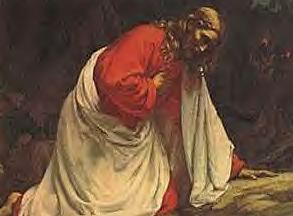See, O Lord, and consider, for I am become vile… O all ye that pass by the way, attend, and see if there be any sorrow like to my sorrow:

Thus Jeremiah laments at the time of the Babylonian captivity, nonetheless, we Christians, hear his words prophetically – as if uttered by Our Lord Himself on the cross.
“Is there any sorrow like to my sorrow”?
The answer, of course, is no! There is no sorrow like unto the sorrow of Our Lord.

St. Thomas Aquinas considers the question “Whether the pain of Christ’s passion was greater than all other pains?”
To make a long story short he says, basically, “Yes, it was.”
But what about the inner movements of the sensitive appetite which we call the passions? Granted that Christ suffered the greatest pain physically, did he also suffer sorrow and fear in a more intense way than anybody else?
Was the sorrow of Christ greater than all other sorrow? Is there any sorrow that is greater than our Lord’s sorrow?

Before we answer that question, I think it is fair to ask, in what manner did Our Lord sorrow?
I know that it would appear obvious that Our Lord experienced sorrow. In St. Matthew’s passion narrative we read,
Then cometh Jesus with them unto a place called Gethsemane, and saith unto the disciples, “Sit ye here, while I go and pray yonder.
And he took with him Peter and the two sons of Zebedee, and began to be sorrowful and very heavy.
Then saith he unto them, “My soul is exceeding sorrowful, even unto death: tarry ye here, and watch with me.”
How are we to understand this?
Answering, the great fourth century Doctor of the Church, Saint Hillary comments,
These words, He began to be sorrowful and very heavy, are interpreted by heretics that fear of death assailed the Son of God, being (as they allege) neither begotten from eternity, nor existing in the Father’s infinite substance, but produced out of nothing by Him who created all things; and that hence He was liable to anguish of grief, and fear of death. And He who can fear death can also die; and He who can die, though He shall exist after death, yet is not eternal through Him who begot Him in past time.

Many would interpret the sorrow of our Lord as a fear of death. Fear and sorrow are certainly connected in so far as we fear that thing which will cause us sorrow should we encounter it and, heaven forbid, if we should have the misfortune of obtaining or possessing the object of our fear.
Hillary continues,
I suppose that there are some who offer here no other cause of His fear than His passion and death. I ask those who think thus, whether it stands with reason that He should have feared to die, who banished from the Apostles all fear of death, and exhorted them to the glory of martyrdom?
How can we suppose Him to have felt pain and grief in the sacrament of death, who rewards with life those who die for Him? And what pangs of death could He fear, who came to death of the free choice of His own power? And if His Passion was to do Him honour, how could the fear of His Passion make Him sorrowful?
I love Saint Hillary!
Our Lord was not afraid to die. It is ridiculous to assert that He, for whom the love of so many saints impelled the joyful embrace of martyrdom, was Himself afraid or sad about His own death. Our Lord was not sorrowful because he had to undergo his passion. He was not sorrowful about accomplishing his own mission.
Well then, how was it that he was sorrowful?
Again Hillary points us in the right direction.
Since then we read that the Lord was sorrowful, let us discover the causes of His agony. He had forewarned them all that they would be offended, and Peter that he would thrice deny his Lord; and taking him and James and John, He began to be sorrowful. Therefore He was not sorrowful till He took them, but all His fear began after He had taken them; so that His agony was not for Himself, but for them whom He had taken.
Our Lord was sorrowful not on his own account but rather on account of those whom He loved.

Saint Thomas Aquinas adds significantly to our discussion in his question about Whether Christ’s soul was passable?
One significant reason why we suffer is because we are subject, in a greater or lesser extent, to our passions. (from the Latin patior, pati, passus- to suffer.)
St. Thomas says,
We must know that the passions were in Christ otherwise than in us, in three ways. First, as regards the object, since in us these passions very often tend towards what is unlawful, but not so in Christ.

Christ endured no appetite for something which was contrary to His reason. He was not attracted to anything sinful or unlawful.
Secondly, as regards the principle, since these passions in us frequently forestall the judgment of reason; but in Christ all movements of the sensitive appetite sprang from the disposition of the reason. Hence Augustine says that “Christ assumed these movements, in His human soul, by an unfailing dispensation, when He willed; even as He became man when He willed.”
This is important. In Christ we find the perfect order of reason that God created in Adam. Everything in Christ, with regard to his humanity, was subject to His reason as to a first principle. This is not my experience! I find myself moved in many directions long before my reason has had time to catch up and make a belated attempt to reinistill some kind of order.
Thirdly, as regards the effect, because in us these movements, at times, do not remain in the sensitive appetite, but deflect the reason; but not so in Christ, since by His disposition the movements that are naturally becoming to human flesh so remained in the sensitive appetite that the reason was nowise hindered in doing what was right. Hence Jerome says that “Our Lord, in order to prove the reality of the assumed manhood, ‘was sorrowful’ in very deed; yet lest a passion should hold sway over His soul, it is by a propassion that He is said to have ‘begun to grow sorrowful and to be sad'”; so that it is a …”passion” when it dominates the soul, i.e. the reason; and a “propassion” when it has its beginning in the sensitive appetite, but goes no further.
This is why Saint Jerome says,
Our Lord therefore sorrowed to prove the reality of the Man which He had taken upon Him; but that passion might bear no sway in His mind, “He began to be sorrowful” by pro-passion for it is one thing to be sorrowful, and another to be very sorrowful.
And finally Saint John Damascene confirms this by saying,
Wherefore the passions of our nature were in Christ both by nature and beyond nature. By nature, because He left His flesh to suffer the things incidental to it; beyond nature, because these natural emotions did not in Him precede the will. For in Christ nothing befell of compulsion, but all was voluntary; with His will He hungered, with His will He feared, or was sorrowful.





Thanks … this is food for thought. Propassion is new to me. Also, “In Christ we find the perfect order of reason that God created in Adam. Everything in Christ, with regard to his humanity, was subject to His reason as to a first principle.” Do we retrieve this perfect order of reason created in Adam after death?
Thank you Mariann. Yes we will retrieve that perfect order after death – although, speaking only for myself, probably after a very long time in purgatory
Thanks also for the perspective and the teachings of Hillary and Aquinas. Very helpful. However still troubling in this regard is Jesus’ asking of the Father to have this cup taken from Him, if it be his will. He seems to ask one last time if this passion and death is necessary.
No doubt you have seen this by now: https://lionandox.com/2017/04/10/father-let-this-chalice-pass-from-me-2/